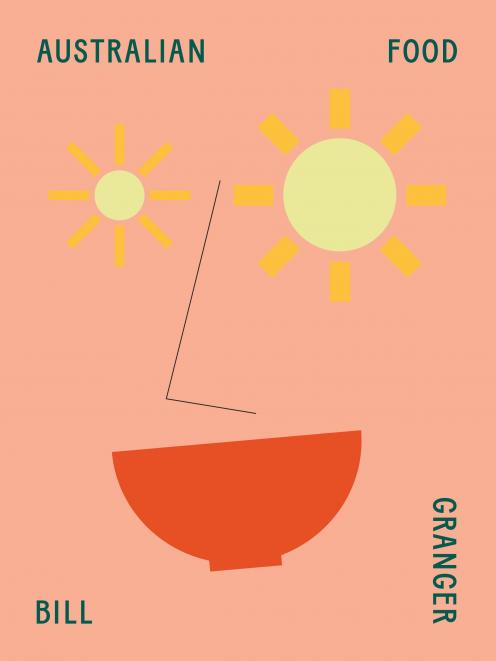
In Australian Food, Granger looks back over the years to work out what made his first Sydney cafe a success and how his particular menu of "Australian food" came about.

He believes Australia serves the sort of food that brings people together - at communal tables enjoying all-day menus - and makes everyone feel good.
But, he says, it’s not just about the food. It’s about the way its served, the casualness of dining, the easy opportunities to eat outside.
There is also no set menu for Australia, which takes its influences from large migrant communities.
"Perhaps that is why it is so interesting. We’re up for anything and open to change."
Granger, who was credited with popularising avocado on toast after serving it at his cafe, has gone on to open cafes and restaurants around the world.
He has included several classics in his new book, including avocado and poached egg on rye. The book also has a section on grains, seeds and juices, which covers chia puddings, brown rice and miso porridge.
The book also covers "breakfast plates", with recipes such as brunch bowls and tofu scramble, and cafe favourites such as brownies, loafs, shortbread, chocolate chips feature in the bakery section before a chapter on bowls, salads and small plates.
He finishes off with chapters on barbecued food, big plates and sweets.
"A few of the recipes in this book are meals from home, but most are dishes that have appeared on our menus over the last 27 years. Favourite recipes become a personal biography, reminding you of life markers with a flavour on the tongue or a cooking aroma."

Kimchi, spinach and ricotta dumplings
I’ve always adored the sour-sweet tang of pickles and sauerkraut, long before we all discovered their links to great gut health.
Even as a child, I loved little pickled onions from a jar (although I’m not entirely sure of their implications for gut health). In more recent times, Australia has discovered the joy of kimchi. I was so excited when I got the opportunity to open a restaurant in Korea. I flew out there one January, into the freezing cold, and ate bags of hot dumplings filled with new flavours and textures.
This recipe is based on Korean kimchi mandu, but using the Western favourite, ricotta. It is a strange-sounding combination that really works. This recipe makes a good big batch of dumplings - you can freeze them, filled but uncooked, for up to 1 month.
Makes 44
Dashi
70g kombu
30g bonito flakes
Dumplings
2 large bunches spinach, stalks trimmed
250g kimchi, drained, chopped
2 spring onions, chopped
60g fresh ricotta, gently crumbled
44 wonton wrappers
1 egg, lightly beaten
To serve
chilli oil
Method
For the dashi
Combine the kombu and 1.25 litres of water in a saucepan. Simmer, partially covered, over low heat for 20 minutes, then add the bonito flakes and simmer for a further 5 minutes. Leave to cool, then strain.
To make the dumplings
Put the spinach in a large heatproof bowl and cover with boiling water. Leave for 30 seconds, then drain and plunge into iced water. Leave for 30 seconds, then drain and squeeze out all the water. Weigh out 80g of the spinach. Chop and separate it so it doesn’t clump.
Gently mix the spinach with the kimchi, spring onions and ricotta, without breaking up the ricotta too much.
Working with a few at a time, lay the wonton wrappers on a work surface and brush a little beaten egg around the edges. Place 1 heaped teaspoon of filling in the centre of each. Fold in half, removing any air pockets, and seal the edges by pinching together with your fingers.
Reheat the dashi in a pan and poach the dumplings in batches for 2 minutes. Lift out with a slotted spoon. Serve with a spoonful of dashi and a little chilli oil.

Pistachio and olive oil friands with orange blossom frosting
Even though friands are a traditional French cake, they’ve become an Australian cafe classic. This recipe uses ground pistachio nuts, rather than the traditional almonds. The pistachio gives the cakes a beautiful pale-green colour.
Makes 10
3 eggs, lightly beaten
200g caster sugar
1 tsp vanilla extract
120ml olive oil
100g butter, melted
200g ground pistachios
55g polenta
55g plain flour
1 tsp baking powder
Orange blossom frosting
150g cream cheese, softened
½ tsp vanilla extract
75g Greek yoghurt
25g icing sugar, sifted
½ tsp orange blossom water
To decorate
55g pistachios, roughly chopped
Freeze-dried raspberry powder
Method
Heat the oven to 170degC.
Grease 10 150ml silicon moulds or friand tins.
Whisk together the eggs, sugar and vanilla extract. Combine the olive oil and butter and slowly add to the egg mixture, whisking constantly.
Mix the ground pistachios, polenta, flour and baking powder together. Add to the mixture, whisking constantly until just combined.
This is a wet batter, so do not be tempted to add more flour.
Pour the batter into the moulds and bake for 15 minutes or until a skewer poked into the centre comes out clean.
To help the friands keep their
green colour, put a roasting tin of
water in the bottom of your oven while you bake them (this will prevent browning).
To make the frosting
Beat the cream cheese to soften. Beat in the vanilla and yoghurt until smooth. Beat in the icing sugar and then the orange blossom water.
Spread the frosting on the friands, then scatter with chopped pistachios and freeze-dried raspberry powder to serve.

Warm spelt salad with roasted spiced oranges
One of the unexpected side-effects of this salad is that roasting the oranges will leave your kitchen smelling spectacular! This is a great festive Christmas dish to serve with roast meats, fish or haloumi.
Use thin-skinned oranges as you’ll be roasting and eating the whole fruit.
Serves 4
2 small oranges, unpeeled, finely sliced
1 tsp fennel seeds
1 tsp cumin seeds
1 tsp chilli flakes
2 tsp runny honey
4 Tbsp olive oil
200g spelt
1 garlic clove, crushed
juice of ½ lemon
1 large carrot, grated
1 handful dill, chopped
1 handful mint leaves, chopped
Method
Heat the oven to 220degC. Line a large oven tray with baking paper and arrange the orange slices in one layer.
Mix the fennel, cumin, chilli and honey with half the oil and season with salt. Spoon over the orange slices, spreading evenly with the back of the spoon.
Roast for 15-20 minutes until the oranges are caramelised and slightly charred.
Meanwhile, cook the spelt in boiling salted water for 20 minutes, or until just cooked. Drain and return to the pan. Add the garlic and remaining 2 tablespoons of olive oil. Add the lemon juice and toss together well.
Set aside for 10 minutes to cool slightly and then stir in the orange slices, carrot, dill and mint. Season to taste with sea salt and freshly ground black pepper.













